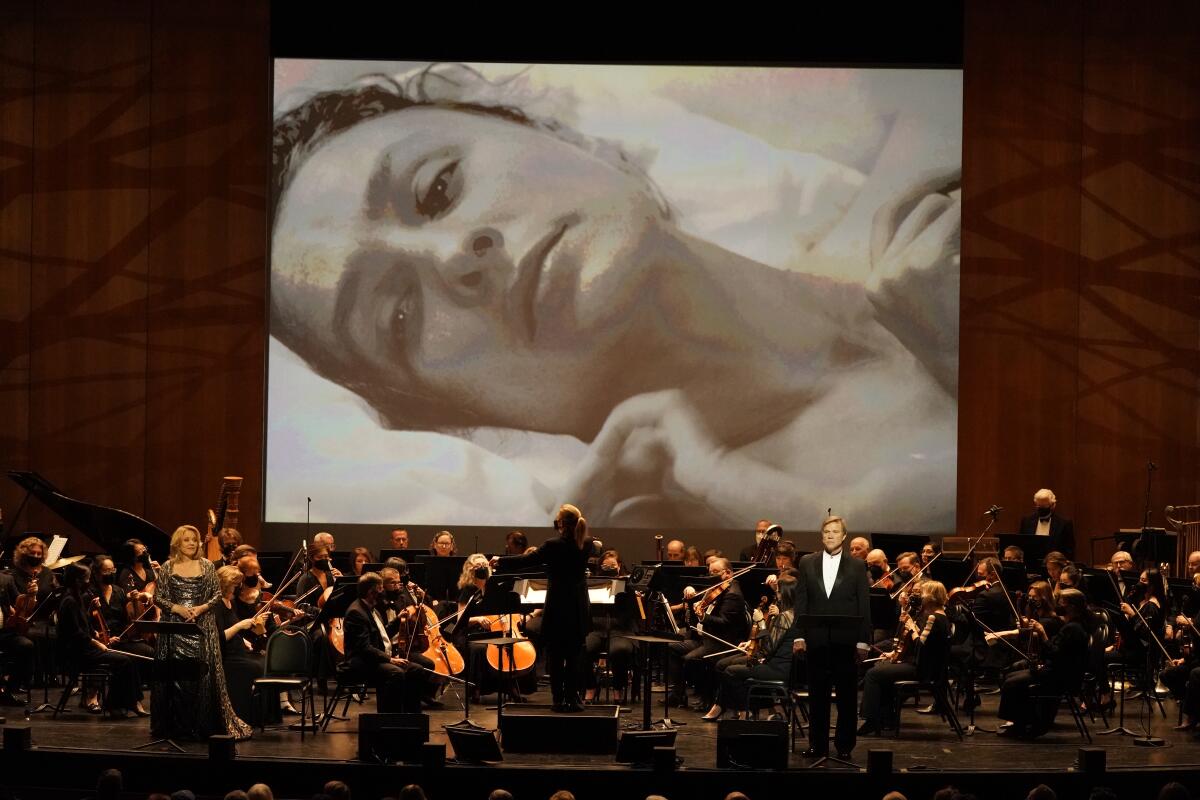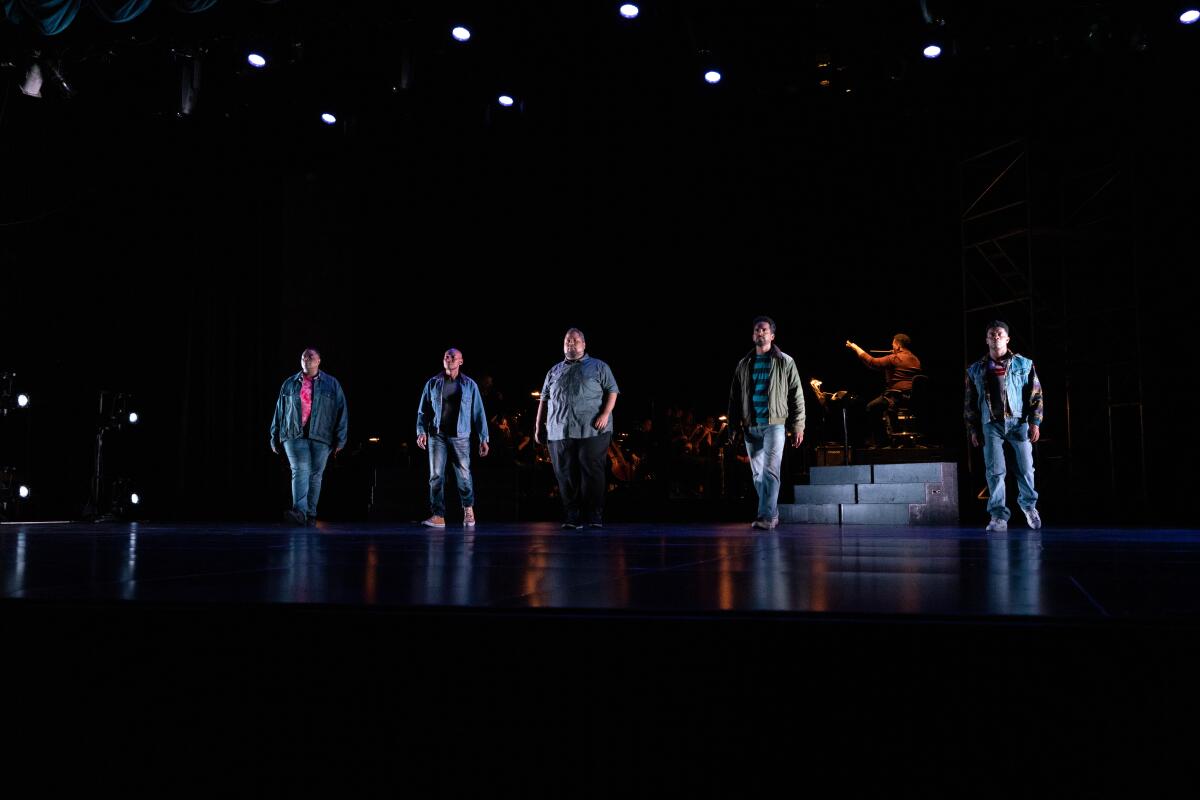Review: How well does opera represent reality? LBO and L.A. Opera take differing approaches

- Share via
Los Angeles Opera and Long Beach Opera have ended their seasons with semi-staged recent works by Pulitzer Prize-winning opera composers. Disaster nearly beset both events. Other than those two striking coincidences — and a not insignificant third one being that the works premiered six weeks apart in 2019! — the occasions had nothing in common.
At the Dorothy Chandler Pavilion Saturday night, L.A. Opera gave a one-night performance of Kevin Puts’ “The Brightness of Light,” a cinematic, feel-good orchestral song cycle based on love letters between painter Georgia O’Keeffe and photographer Alfred Stieglitz. In stark contrast that same evening (with a repeat Sunday afternoon) at a high school in north Long Beach, LBO mounted Anthony Davis’ anti-cinematic, feel-bad masterpiece “The Central Park Five.”
“The Brightness of Light” was written as a starry vehicle for soprano Renée Fleming and baritone Rod Gilfry, and in the three summers since its premiere by the Boston Symphony at Tanglewood, it has been seeing the light of day from orchestras around the land. The romance between the 30-something emerging painter and the then-54-year-old famed photographer is American art lore, easily exhibited not only in their love letters but also in how their relation is represented in their work, which includes Stieglitz’s famous nude photographs of O’Keeffe.
O’Keeffe and Stieglitz were well and brightly illuminated visually, as well, on a screen behind the orchestra on the Chandler stage. Their letters — enraptured and captivating but not written for literate sharing — were further illumined in Puts’ score, emphasizing the obvious with grandeur and sentiment. Puts favors straightforward narrative; his Pulitzer-winning opera, “Silent Night,” was adapted from the screenplay to the French film “Joyeux Noël.” His latest opera, which receives its first staging at the Metropolitan Opera next season, is based on the novel and film “The Hours.”
Although the vocal writing is sympathetic to both Fleming and Gilfry (who happen, in another of a weekend of coincidences, to have been born less than a month apart in 1959), the spotlight is on O’Keeffe. What lingers in the memory is the continued beauty of Fleming’s voice, perfectly exploited in a nostalgic final last song — in the manner of Strauss’ “Four Last Songs” — from near the end of the nonagenarian painter’s life in Taos, N.M., four decades after Stieglitz’s death.
The unexpected attention happened to be on the young New Zealand conductor Gemma New, making her L.A. Opera debut. Though she conducted “Brightness of Light” with bright vigor before intermission, she suddenly became indisposed (no details have been provided). Grant Gershon, thus, made his unexpected final appearance as the company’s resident conductor for a second half of Broadway show tunes.
Fleming and Gilfry vamped entertainingly between each number, presumably allowing Gershon a quick glance at scores he had not seen before. “Some Enchanted Evening” and “Climb Ev’ry Mountain” took on new significance. Another conductor who could have pulled this off with Gershon’s skill and nonchalance to pop into my head was André Previn. Among the evening’s ironies is that two numbers on the program from Previn’s opera “A Streetcar Named Desire,” which Fleming and Gilfry had premiered, contain music by a former first-rate film composer too intricate to be vamped and had to be cut.
Yet another irony: The same night in Chicago, Lina González-Granados, who succeeds Gershon as L.A. resident conductor for the new season, was in the midst of making her unexpected final performances as the Chicago Symphony’s conducting apprentice. She was filling in for Riccardo Muti, who had tested positive for COVID-19.

Saving the day for “The Central Park Five,” an LBO commission that won the music Pulitzer for Davis and that the company hoped to remount in a new production, was more convoluted. The operatic imperative for illuminating the racist imprisonment of five teenagers falsely accused of rape in New York in 1989 has only increased since the premiere.
But the company’s own troubles, stemming from several staff members’ resignations and accusations that the opera fostered a “culture of misogyny” and “racial tokenism,” meant that it lost the director and some of the cast for the new production, leaving too little time and too few resources to credibly mount a new production. (LBO responded by conducting an internal investigation and stating that the allegations are “inconsistent with the values of the company.”) The idea became to focus on Davis’ score and prepare a concert performance that could be recorded.
That will happen at a studio this week, with a release in the fall. Fortunately, the large cast, to a person, proved convincing (some of the singers had been in the premiere). Anthony Parnther conducted with gripping authority. The 18-member instrumental ensemble was compelling (there are many riveting solos). The recording promises to be essential.
Davis’ operas, starting with the 1986 “X: The Life and Times of Malcolm X,” which was recently revived in Detroit and is also being recorded, tend to have a strong narrative but are not driven by that. “X,” the 1989 “Tania” (about Patricia Hearst) and the 1997 “Amistad,” along with “Central Park Five,” all had notable contemporaneous films, but Davis’ operas ask us not so much to experience familiar events anew as to contemplate from knowledge to feel motivations.
While video projections enhanced “Brightness of Light,” the documentary video footage in the original production of “Central Park Five” accomplished the opposite by amplifying action. Davis’ score, however, doesn’t mirror reality, which too easily offers the satisfaction of knowing exactly how to feel. The music here operates as a force of nature, with a structure and purpose of its own. In that way, it allows room for individual expression of singers along with the bluesy instrumental solos that serve as guides for our own practicing of emotions as we internalize outrage.
The performance onstage in the newly renovated auditorium of Jordan High School was semi-staged without undo fuss by J. Ed Araiza, although the required amplification could turn shrill. The cast, be it the Five — Cedric Berry, William Powell II, Bernard Holcomb, Orson Van Gay and Ashley Faatoalia — parents, prosecutors, a figure called the Masque (Justin Ryan) or a ludicrous Donald Trump (Todd Strange), made you believe in the awesome power of justice, be it failed or finally achieved.
Operatic comeback hasn’t been easy this season for anyone. So far, LBO appears to be weathering its crisis. L.A. Opera, on the other hand, has the different, difficult brief of needing to satisfy a broad audience rather than only challenge.
“Brightness” may not have been its bright spot this season but L.A. Opera, too, boasts premiering Pulitzer opera with a point — Ellen Reid’s “prism” won the music prize the year before “Central Park Five.” With the help of Beth Morrison Projects, the company has kept up with cutting-edge opera. It has made progress a priority this season, particularly in its notable employment of singers of color, and has inaugurated a compelling series of short video operas on its website.
What it hasn’t done yet, however, is mount an opera by Anthony Davis.
More to Read
The biggest entertainment stories
Get our big stories about Hollywood, film, television, music, arts, culture and more right in your inbox as soon as they publish.
You may occasionally receive promotional content from the Los Angeles Times.











